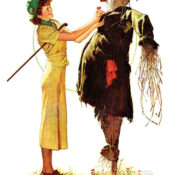- Nigel’s ___________________ scheme to frame John was doomed to failure.
- hairbrained
- harebrained
- Everyone knew that John was angry, that the smile on his face was pure ___________________.
- dissimilation
- dissimulation
- Kramer prefers a decal to a sticker, a gateman to a bouncer, and spoons to forks, and he only drinks decaf. What does Kramer prefer?
Answers
- b
- b
- Kramer prefers anadromes (also called heteropalindromes), words that spell other words when their letters are reversed.
This article is featured in the November/December 2020 issue of The Saturday Evening Post. Subscribe to the magazine for more art, inspiring stories, fiction, humor, and features from our archives.
Featured image: Kues / Shutterstock
Become a Saturday Evening Post member and enjoy unlimited access. Subscribe now




Comments
Gary: At least one source I found agrees with your suspicion. Robert Hendrickson (Facts on File Encyclopedia of Word and Phrase Origins, 4e) dates the phrase back to the mid-19th century, originating from the idea that a man would take his shirt off before a fight. He also notes an earlier British phrase “to get one’s short out,” meaning “to lose one’s temper,” which I had never heard before.
I have always suspected that the idiom “keep your shirt on” refers to a pre-factory-garment era habit of men taking off their shirts before “duking it out”. Because getting a bloodstained shirt was perhaps worse than getting a bloody nose. But I cannot prove that is true. Do you know?